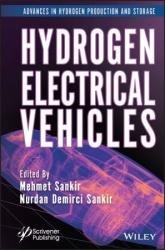Hydrogen Electrical Vehicles
- Добавил: literator
- Дата: 18-02-2023, 19:08
- Комментариев: 0
 Название: Hydrogen Electrical Vehicles
Название: Hydrogen Electrical VehiclesАвтор: Mehmet Sankir, Nurdan Demirci Sankir
Издательство: Wiley-Scrivener
Серия: Advances in Hydrogen Production and Storage (AHPS)
Год: 2023
Страниц: 272
Язык: английский
Формат: epub (true)
Размер: 22.6 MB
Hydrogen electrical vehicles are an essential component of the “Green New Deal” and this book covers cutting-edge technologies designed for fuel-cell-powered cars.
Fuel cells use hydrogen directly in most types of vehicles—from passenger cars to trains—without some of the disadvantages of batteries such as low energy density, high initial costs, and a slow charge. Therefore, the number of hydrogen filling stations required for fuel cells, about one-tenth of the number of fast-charging stations, can meet the same needs as batteries. Additionally, hydrogen charging is at least three times faster. Therefore, it is essential to emphasize that hydrogen-powered transportation is still the most reasonable way to reduce emissions.
As part of our “Advances in Hydrogen Productıon and Storage” series, this volume covers the cutting-edge technologies used in fuel cell-powered cars. Additionally, it highlights the research efforts presented in the literature while adding a valuable component to the area. It also discusses basic as well as advanced engineering details for both scientists and engineers in academia and industry.
The use of small unmanned aerial vehicles (UAVs) with electrical propulsion systems in both military and civilian areas has attracted considerable attention in recent years. In such UAVs, batteries, supercapacitors, hydrogen-fuel cell systems, piezo materials, and solar cells can be used to power the electric motors during the flight. These systems have different specifications in terms of cost, energy and power density, dynamic response, efficiency, lifetime, etc. and none of these energy sources alone can hardly meet the power demand of a UAV. For this reason, hybrid systems, which are a combination of these energy components, have been proposed in the literature. Such hybrid systems require appropriate energy management to increase the total efficiency of the system, lifetime of each energy component, and flight time/range of UAV. Energy management techniques applied to hybrid systems are divided into two classes, active or passive. Active energy management strategies are more efficient but require more complex system topologies than passive methods. This study presents different hydrogen-based systems that can be used to feed the electric motors in UAVs and compare them with other technologies in terms of several Key Performance Indexes. Moreover, different hybrid system topologies proposed for fuel cell-based small UAVs and their passive/ active energy management techniques such as rule-based, optimization-based, and learning-based strategies are examined and discussed. Finally, future work topics on the use of fuel cells in UAVs are proposed, which could be important to optimize the flight time/range and the energy consumption of UAVs.
The subjects covered in the book include:
An introduction to hydrogen and electrical vehicles;
Hydrogen storage and compression systems;
Hydrogen propulsion systems for UAVs;
Test and evaluation of hydrogen fuel cell vehicles;
Hydrogen production and PEM fuel cells for electrical vehicles;
The power and durability issues of fuel cell vehicles.
Audience:
The book will attract readers from diverse fields such as chemistry, physics, materials science, engineering, mechanical and chemical engineering, as well as energy-focused engineering and hydrogen generation industry programs that will take advantage of using this comprehensive review of the hydrogen electrical vehicles.
Contents:
Preface
1 Hydrogen Electrical Vehicles
2 Study on a New Hydrogen Storage System – Performance, Permeation, and Filling/Refilling
3 A Review on Hydrogen Compression Methods for Hydrogen Refuelling Stations
4 Current Technologies and Future Trends of Hydrogen Propulsion Systems in Hybrid Small Unmanned Aerial Vehicles
5 Test and Evaluation of Hydrogen Fuel Cell Vehicles
6 Hydrogen Production and Polymer Electrode Membrane (PEM) Fuel Cells for Electrical Vehicles
7 Power Density and Durability in Fuel Cell Vehicles
Index
Скачать Hydrogen Electrical Vehicles (Advances in Hydrogen Production and Storage (AHPS))
[related-news] [/related-news]
Внимание
Уважаемый посетитель, Вы зашли на сайт как незарегистрированный пользователь.
Мы рекомендуем Вам зарегистрироваться либо войти на сайт под своим именем.
Уважаемый посетитель, Вы зашли на сайт как незарегистрированный пользователь.
Мы рекомендуем Вам зарегистрироваться либо войти на сайт под своим именем.
